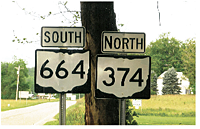By David Faust
 While driving toward scenic Hocking Hills State Park in central Ohio, I got lost for a few minutes. It’s no wonder I was confused. Two road signs located side by side said “South 664” and “North 374.” How could the same road go north and south at the same time?
While driving toward scenic Hocking Hills State Park in central Ohio, I got lost for a few minutes. It’s no wonder I was confused. Two road signs located side by side said “South 664” and “North 374.” How could the same road go north and south at the same time?
You can find other strange or amusing signs on the Internet. Some of my favorites include:
• Next to a driveway: “Entrance only. Do not enter.”
• At a car wash: “Wash and vacuum senior citizens $15.95.”
• Near a park entrance: “Beware: wild animals/children.”
• On a church sign: “Don‘t let worries kill you. Let the church help.”
• In the front yard of a house: “Never mind the dog. Beware of the owner!”
• And finally: “This is the back door. Front door is around the back.”
Our lives are signposts. Are we pointing others in the right direction? Does our behavior lead to clarity or confusion?
Jesus said, “Things that cause people to stumble are bound to come” (Luke 17:1). The word translated “stumble” is skandalon, from which we derive “scandal.” The Greeks used it to describe the bait-stick on a trap that ensnares or trips someone up. In this context, “it seems to mean any sinful act or habit which consciously or unconsciously lures others into sin” (R. C. Foster). Human experience confirms the Lord’s observation. Spiritual traps are plentiful. Temptations are inevitable. As Jesus noted, enticements to stumble and sin are “bound to come.”
This doesn’t mean, however, that we bear no responsibility if we point others in the wrong direction. The Lord continued, “But woe to anyone through whom they come. It would be better for them to be thrown into the sea with a millstone tied around their neck than to cause one of these little ones to stumble. So watch yourselves” (vv. 1-3). William Barclay summarizes Jesus’ words by saying, “God will not hold the man guiltless who, on the road of life, sends a younger or weaker brother on the wrong way.”
Pointing in the Right Direction
Who are these “little ones” Jesus says we shouldn’t mislead? Certainly he has young children in mind. Little ones learn by example. Do we want our children and grandchildren to learn how to curse by listening to us? To stay away from church because we never go? To gossip about others because we do? Children read the signposts of our lives. Do the signs point them toward self or toward God, toward kindness or toward mean-spiritedness?
Or perhaps the “little ones” are young believers, new in their faith—like “infants, tossed back and forth by the waves, and blown here and there by every wind of teaching” (Ephesians 4:14). That’s a scary picture—a tiny, vulnerable baby clinging to a life raft in the midst of a raging storm. Vulnerable young Christians need to rub shoulders with mature disciples “who by constant use have trained themselves to distinguish good from evil” (Hebrews 5:14). They need godly leaders who will “set an example for the believers in speech, in conduct, in love, in faith and in purity” (1 Timothy 4:12).
We don’t live for ourselves alone. We point others toward God or away from him. We lead them up the triumphant route to Heaven or down the tragic path to Hell. Others will sink or swim based on our example—and no one can swim with a millstone around his neck.
CONSIDER:
1. What messages do others read as they observe your lifestyle?
2. What “little ones” has God given you the opportunity to influence?
David Faust is president of Cincinnati Christian University, Cincinnati, Ohio, and past Executive Editor of The Lookout.
The Lookout’s Bible Reading Plan for August 18, 2013
Use this guide to read through the Bible in 12 months. Follow David Faust’s comments on the highlighted text in every issue of The Lookout.
Luke 16:19–31
2 Timothy 1:1–7
Proverbs 10:17–32
Nehemiah 4, 5
Luke 17:1–10
2 Timothy 1:8–18
Proverbs 11:1–15
Nehemiah 6
Luke 17:11–19
2 Timothy 2:1–13
Proverbs 11:16–31
Nehemiah 7
Luke 17:20–37
2 Timothy 2:14–26
Proverbs 12:1–14
Nehemiah 8
Luke 18:1–8
2 Timothy 3:1–9
Proverbs 12:15–28
Nehemiah 9
Luke 18:9–17
2 Timothy 3:10–17
Proverbs 13:1–12
Nehemiah 10




Comments: no replies